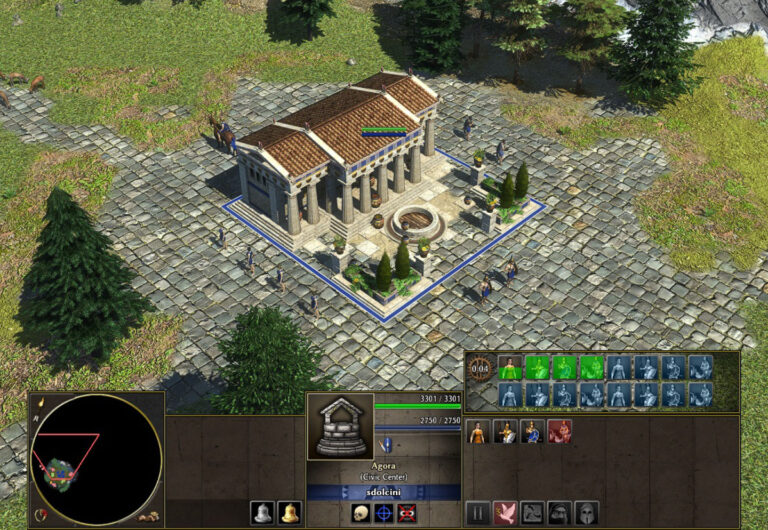0 A.D.: Reviving History in Real-Time, in FOSS!

0 A.D., developed by Wildfire Games, is a testament to the power of collaboration and open-source development. We wanted to learn more about the game and how the creators achieve historical accuracy. In this interview, we speak with Stanislas Dolcini, a member of the 1hour team and Full Stack Software Engineer at onepoint, about the game’s origins and unique features.
Could you tell us more about the concept behind 0 A.D. and what inspired its development?
0 A.D. began as a collaboration between the Tonto Clan and Wildfire Studios to pitch to Ensemble Studios. The game was initially intended as a remake of Age of Empires: The Rise of Rome. When Ensemble opted for Age of Mythology, Wildfire shifted to creating a “total conversion” mod for Age of Empires II. Facing the limitations of modifying a closed-source game, they decided to create a standalone game, which evolved into 0 A.D. The full history is available on the wiki.
The game focuses on historical accuracy. How do you ensure that the game accurately portrays ancient civilizations while also being enjoyable for players?
Balancing historical accuracy with playability is challenging. 0 A.D. features diverse civilizations, each with unique buildings, armies, and history. We rely on historical sources and individual expertise, but some inaccuracies remain due to a shortage of artists. Striking a balance between realism and fun is our goal, though it’s not always straightforward. Ideally, we aim to offer modes that prioritize accuracy or playability, but that’s a complex task.
What are some of the major civilizations featured in 0 A.D., and how do you decide which civilizations to include?
We feature many Greek-based civilizations like Spartans, Athenians, and Macedonians due to the abundance of historical information. Other civilizations include Romans, Celts (Britons, Iberians, Gauls), Han Chinese, Persians, Kushites, Carthaginians, and Mauryans. Mods like Delenda Est expand this roster with civilizations such as Yayoi Japan and Scythians. New additions don’t follow a strict process; for example, the Kushites were added after significant community interest, and the Han Chinese were incorporated from a large mod showcasing the engine.
Can you elaborate on the development process of 0 A.D.? How has the game evolved since its inception in 2001?
0 A.D. began in 2001 with just a design document, in the hope that Ensemble Studios would develop it. Building the game’s foundation, originally called the Prometheus Engine (now Pyrogenesis Engine), was a major task. Until 2009, development was closed source, but as team members took on new life responsibilities, they decided to open-source the project to sustain it. By 2015, the game became playable, with a multiplayer lobby introduced. In 2020, I took over leadership, focusing on performance, visibility, and moddability, with record activity during the COVID-19 pandemic.
As a free and open source game, what are some of the challenges you face in terms of funding and development?
Maintaining 0 A.D. requires balancing trust and commitment from contributors, which can be challenging, especially with incidents like the recent XZ CVE issue. Since the project relies on goodwill, it’s crucial to value each person’s contributions without over-expecting. Different motivations are natural, and focusing on what genuinely interests you helps maintain enthusiasm and avoid burnout.
What sets 0 A.D. apart from other real-time strategy games in terms of gameplay and mechanics?
0 A.D.: Empires Ascendant retains core mechanics from Age of Empires, created by fans of the franchise. Although it shares the “explore, expand, exploit, exterminate” cycle common in strategy games, it’s not classified as a 4X game. It also resembles Battle For Middle Earth in its military formations and Empire Earth in its territory system. A distinctive feature is its citizen-soldier system, allowing soldiers to both build and gather resources, which is rare in real-time strategy games.
Could you share some insights into the community behind 0 A.D.? How do volunteers contribute to the development of the game?
There are many ways to contribute to 0 A.D.: Empires Ascendant. The most obvious is by playing—around 1,500 people launch the game daily, based on anonymous feedback. You can engage on the forums, where most balancing discussions occur, or help translate the game via Transifex. Artists can contribute to the Art Subforum, while developers can join the #0ad-dev IRC channel on Quakenet.
What are some of the future plans for 0 A.D.? Are there any upcoming features or expansions that players can look forward to?
Exciting developments are underway for 0 A.D. The biggest change is shifting from an SVN-based workflow to Git, making contributions easier for programmers but potentially challenging for artists. We’re also working on an in-game encyclopedia, player moderation tools like muting, and a new renderer that will boost performance—on macOS, switching from OpenGL to Vulkan can increase FPS up to fivefold.
How has the reception been from players and the gaming community since the release of 0 A.D. as free, open source software?
The reception of 0 A.D. has been largely positive. At events, people are impressed by the game’s quality and surprised it’s still in alpha. Our small but vocal multiplayer community has sparked intense discussions, especially around Alpha 24: Xšayāršā.
We’ve received many requests to put the game on Steam and create an official Discord server. While Steam would boost visibility—an unauthorized listing gained us 1,000 Twitter followers—it could overwhelm our servers. We’re focused on improving the game, adding single-player campaigns, and fixing bugs before considering Steam. You can check on 0 A.D.: Empires Ascendant.
Finally, what message would you like to convey to players and supporters of 0 A.D. about the game’s future and the importance of open source gaming?
As Ken Wood said, “The fate of 0 A.D. is in the hands of those who have vision and perseverance.” After 24 years, the project’s survival is a miracle, thanks to the dedication of players and contributors.
Open source gaming, including 0 A.D., needs more discoverability. Despite being included in most mainstream distributions, it isn’t as well known as it should be. While 0 A.D. is one of the most visually appealing open source games, other great titles also deserve recognition, like Beyond All Reason, SuperTux, SuperTuxKart, and Battle for Wesnoth also deserve recognition.
